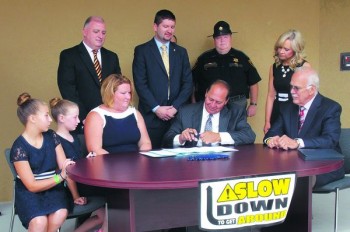
From left, Annaliese Tabler, Jewelia Tabler, Tiffany Tabler, Ron Harman, Delegate Jason Barrett (D-Berkeley), Gov. Earl Ray Tomblin, Berkeley County Sheriff Kenneth “Kenny” Lemaster, Delegate Tiffany Lawrence (D-Jefferson) and Sen. Donald Cookman (D-Hampshire) perform the ceremonial signing of SB 378 to protect sanitation workers from reckless drivers.
MARTINSBURG, W.Va. – During his visit to the Eastern Panhandle Wednesday, Gov. Earl Ray Tomblin hosted a ceremonial bill signing for a law that aims to cut down reckless driving around waste and recycling workers.
The bill, also known as SB 378, requires vehicles to slow down to 15 miles per hour when passing a stopped sanitation truck.
Sen. Donald Cookman, D-Hampshire, introduced the bill in February, after Tiffany Tabler approached him with the need for reform.
In March 2013, a driver killed Tabler’s husband, Jeremy, while at work, after the driver did not slow down near his sanitation truck. Although the driver was not speeding, she said her husband might still be alive, if the driver had been going slower.
After her husband’s passing, Tabler said she was surprised to find the number of sanitation-related traffic incidents.
“I just realized it was a lot more dangerous than I thought,” she said. “I’m glad I was able to do this in honor of my husband’s memory and for those in the industry for their safety.”
Tabler advocated for the bill with the help of lawyer Ron Harman. Harman said he was glad to connect the “gap in our state’s statutes” in relation to sanitation workers.
“I’m honored,” he said.
During the ceremonial signing, Cookman discussed the process of SB 378, in which senate suspended constitutional rule, allowing the reading to advance in the same day.
Prior to the bill making it to the senate, Tabler tesitifed twice. She also witnessed the bill’s passage at the Capitol.
“Here in the Eastern Panhandle, we care about the safety of our workers,” Cookman said.
Cookman said he was glad to work with Harman and Tabler on the bill. He provided both Harman and Tabler with certificates of public service recognition from the senate.
Cookman said the ceremonial signing of SB 378, or the “Slow Down to Get Around Bill,” is a day to celebrate the Tabler family.
In addition, Tomblin stressed the importance of the bill’s passage by saying careless drivers around sanitation drivers have some of the “highest fatality rates in the country.”
Tomblin met with Tabler, along with her two daughters, Annaliese and Jewelia, for the ceremonial signing.
Tomblin presented a copy of SB 378, to Tabler, her children and Cookman.
After the signing, Tabler said she would like to thank anyone who had a part in making sure the bill got put through.
Tabler said her experiences testifying and traveling to the Capitol were intimidating at first, but she said it was an “amazing experience.”
“Everyone was so wonderful and I’m surprised the session got suspended so that it could go through so quickly, which almost never happens,” she said.
Tabler has also been documenting their family’s journey to pass new legislation because of Jeremy’s death. Since Annaliese and Jewelia are too young to understand, Tabler said she has been keeping a journal to give to the girls when they are older.
Many sanitation workers from Apple Valley Waste also supported the ceremonial bill signing.
Robert Schroyer, a sanitation worker, said he believed the bill was going to make his job much safer.
Schroyer recalled personal experiences of being at work, such as having mirrors brush his clothes because drivers were going too fast.
“This law is definitely going to help. It’s really comforting to us,” he said.





